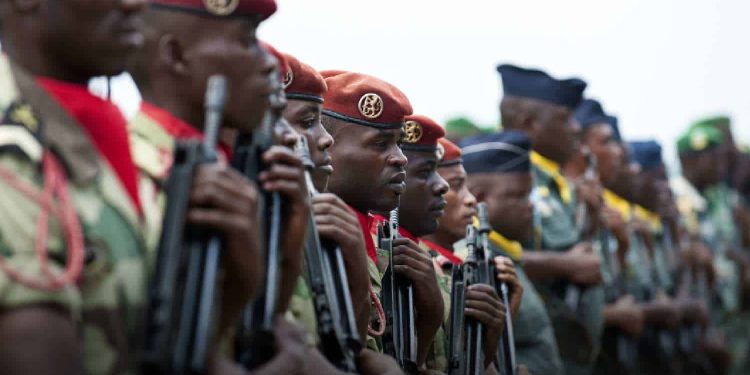In a surprising turn of events, senior military officers in Gabon took to the national airwaves early on Wednesday to declare their seizure of power. This bold move followed the state election body’s announcement that President Ali Bongo had secured a third term.
With cameras rolling on Gabon 24, the officers presented themselves as representatives of the nation’s security and defence forces, voicing their collective decision to take charge.
Decrees Echo Across the Airwaves
In their televised address, the military cohort delivered a series of impactful announcements. They nullified the election results, shut down borders immediately, and dissolved key state institutions.
Audible reports of gunfire echoed through the streets of the capital city, Libreville, following the address, as noted by Reuters correspondents. Despite the stir, the government maintained silence in response.
Notable Quotes from the Coup Plotters
“In the name of the Gabonese people,” the officers made a solemn commitment to uphold peace by dismantling the current regime. The leaders of the junta asserted, “We have chosen to safeguard peace by concluding the present administration,” emphasizing their resolute stance.
“In light of this, the general elections held on 26 August 2023, along with the incomplete results, stand annulled. “Every institution within the republic is dissolved, including the government, Senate, National Assembly, and Constitutional Court,” they declared. Furthermore, they announced the temporary closure of the nation’s borders “until further notice.”
A Turbulent Backdrop to the Coup
Tensions had been mounting in Gabon due to concerns regarding potential turmoil in the aftermath of recent presidential, parliamentary, and legislative elections.
President Bongo sought to extend his family’s nearly six-decade rule, while opposition voices championed change in the resource-rich yet struggling nation, heavily reliant on oil and cocoa.
Transparency doubts clouded the electoral process, stemming from the absence of international observers, suspension of select foreign broadcasts, internet restrictions, and a nationwide curfew post-election.
Ripple Regional Effect
The Gabon coup comes amid a resurgence of military takeovers in Africa, reminiscent of the 1960s. The military is back in power in a growing African countries.
Since 2020, the continent has witnessed an increase in such incidents, with approximately six coups registered across countries like Guinea-Bissau, Gambia, Burkina Faso, Sao Tome, and Cape Verde.
The recent military intervention in Niger appears to be a turning point, as African leaders and global partners united in condemning the coup, vowing to restore constitutional order.
The international community’s reaction to the Gabon coup attempt will undoubtedly be influenced by the nature of the country’s election process and the prolonged grip of President Ali Bongo’s family on leadership.
Uncertain Horizons Ahead
As the dust settles over Gabon, the world watches with bated breath to see how this coup attempt pans out. The nation’s political landscape stands at a crossroads, with questions about the international response looming large.
With parallels to prior coups across the African continent and echoes of historical events, the unfolding narrative of Gabon’s struggle for power takes center stage, leaving both local citizens and the international community pondering what lies ahead.












